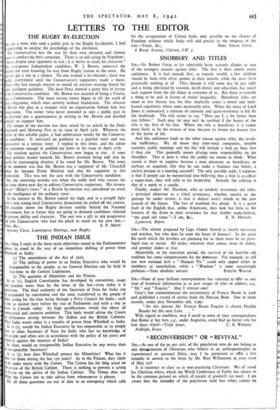SNOBBERY AND TITLES
SIR,—Sir Robert Greig in his admirable letter scarcely alludes to two of the strongest reasons against titles. The first is their almost entire unfairness. It is bad enough that, as regards wealth, a few children should be born with silver spoons in their mouths while the mass have practically nothing at all This, though it will some day be put right and is being alleviated by taxation, death duties and education, has much tacit support from the old Adam in everyone of us. But there is scarcely a thing to be said in favour of titular inequality. Hereditary titles are more or less blatant lies, for they implicitly assert a moral and intellectual superiority where none necessarily exist. When the entry of Lord Jones is announced, a mixture of curiosity and quasi-reverence is felt by the multitude. The title seems to say, "Here am I, a lot better than you fellows." Such may (or may not) be justified if the bearer of the title is the first of his line. Where the title is hereditary it is rather more likely to be the reverse of true, because its bearer has known less of the battle of life.
And this unfairness leads to the other reason against titles, the resulting inefficiency. We all know that joint-stock companies, notable societies, public meetings and the like will include a lord on their lists if they can. This generally means placing some responsibility on his shoulders. That at least is what the public are meant to think. What reason is there to suppose because a man possesses an hereditary, or perhaps an acquired, title that he can make a business run better, a society prosper or a meeting succeed? The only possible reply, I suppose, is that if people can be mesmerised into believing that a lord is ex-officio a super-man, they will rally to his leadership. Actually the rallying is that of a moth to a candle.
Finally, malgre Mr. Nicolson, who so tenderly reverences old titles, a principal objection to a titled aristocracy, whether royalty or the peerage be under review, is that it directs men's minds to the past instead of the future. The fate of mankind lies ahead. It is a grave fault of the English that, unlike Americans, they look but little to the banners of the dawn in their reverence for that shabby make-believe, "the good old times."—I am, &c., E. N. MOZLEY. Lynwood, Ripon.
Sist,—The reform proposed by Capt. Osbert Sitwell is clearly necessary and overdue, but why does he stem the fount of honour? In the great flat earth which the levellers are planning for us there must be no privileged race or nation All males, whatever their colour, must be dukes, and premier dukes at that.
Meanwhile, in the transition -period, the survival of the horrible old tradition has some compensations for the democrat. For example, to call our new national. dish a "Marquis Pie" could only appeal either to snobbery or cannibalism, while a ",Woolton " is most sustainingly plebeian.—Your obedient servant. EVELYN WAUGH.
Sist,—None of your brilliant correspondents has ventured to offer us any item of historical information as to past usages of titles of address, e.g., "Mr." and "Esquire." May I venture one?
Gray's Inn commemorated the tercentenary of Francis Bacon in 5908 and published a record of entries from the Pension Book. One of them records, under date November 9th, 1599: " Att this pencon Mr. Francis Bacon Esquire is chosen Double Reader for this next Lent. . . . "
With regard to snobbery, may I recall to some of your correspondents that Rome at her best, e.g., under Augustus, could find no better title for
him than—God?--Truly yours, C. A. WEEKES. Ardleigh, Essex.






















 Previous page
Previous page